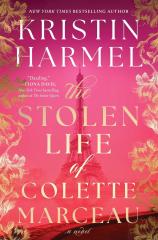Reading Group Guide
Discussion Questions
The Stolen Life of Colette Marceau

1. Chapter One opens with our main character, Colette --- now in her 80s --- preparing to steal from a neo-Nazi at an upscale benefit in Boston. We’re in Colette’s perspective, so we can see her justifications for the theft. Did you agree that Colette’s actions were justified? Or did you start off with the feeling that she was a criminal, regardless of her motives?
2. In Chapter Two, we meet Colette’s mother, Annabel, and we get a bit more insight into why stealing is their family tradition. They believe themselves to be descended from Robin Hood himself. Are there any traditions in your own family --- or things related to your heritage --- that have shaped decisions in your life?
3. Do you believe that being the keeper of a family tradition comes with an obligation to keep that tradition alive? Or do you have the right to chart your own course and leave the past behind?
4. In Chapter Three, we meet Marty, Colette’s longtime jewel broker and her dearest friend. Colette strongly believes that her jewel thefts are justified --- and, in fact, she never keeps the profits for herself. But Marty does keep his percentage of the sales. At the same time, though, he’s not actually the one doing the stealing. Where do you think Marty falls on the spectrum of right and wrong, especially compared with Colette?
5. Aviva and Colette are essentially family to each other, though they’re not related by blood. Do you have someone in your life who you consider family, but who you’re not actually related to? If you do, why is this an important relationship to you, and why do you think it’s so important for Aviva and Colette?
6. Colette is a young teenager when she meets Tristan in 1942, and we’re with her as she begins to fall in love for the first time. Do you remember your first love? Is there anything about your relationship with that person that influenced your future?
7. The Vel’ d’Hiv Roundup of July 16, 1942 has been included in many novels, because it was such a momentous turning point in Paris. More than 13,000 Jewish citizens were arrested, including 4,000 children, and many were sent to their deaths. How would you have felt if you were living in Paris in 1942 and woke up to the news of these mass arrests? What would you have done?
8. When Colette, Aviva and Marty visit the 102-year-old Hubert Verdier, who has dementia, at his assisted living facility in Chapter 15, do you think they had the right to push him hard for answers, since they know he had the stolen bracelet in his possession? Or should they have gone easier on him, as Lucas insists?
9. Throughout the chapters set in the past, we see a growing distance between Annabel and her husband, Roger, who disagree sharply about whether she should continue to steal now that there’s a war happening. Can you think of a time in your life when a tense situation pushed you apart from someone you loved? Were you able to resolve things, or did the situation create a permanent divide between the two of you?
10. In Chapter 19, Colette meets Daniel Rosman, who she realizes is the true owner of the bracelets. And yet Colette has held on to her half of the bracelet for decades, because it was the last tangible link she had to her mother and sister. Do you think she’s obligated to give it back to him? Why or why not?
11. Daniel tells Colette that his father always said that diamonds never really belong to anyone. “They’ll witness births and deaths, war and peace, feast and famine, and yet they’ll live on, for millions of years,” he says. Is there a piece of jewelry --- or another object --- in your own family that has been passed down through the generations? How do you think that having something special that once belonged to someone else links you to that person?
12. In Chapter 22, the prisoners in Cherche-Midi sing “La Marseillaise,” the French national anthem --- and each night at 7:00, they chant, “Notre France vivra,” or “Our France will live.” These are both drawn from real accounts of life in the prison. Many of these prisoners were waiting to be executed and would never set foot outside the prison again. Why do you think these little forms of resistance mattered so much to them?
13. By the end of the book, we’ve gotten an overview of Colette’s lifetime of theft, spanning from pre-war Paris to 2018 Boston. And we also have a sense of why she has always felt that stealing was necessary. Now that you’ve finished the book, how do you feel about her actions? Is it okay to do something illegal if you’re balancing the scales of justice and if you don’t profit personally from the illegal activity? Are the rules for something like this different in wartime than they are in times of peace? In other words, in the end, do you think that the ends justified the means for Colette?
The Stolen Life of Colette Marceau
- Publication Date: March 31, 2026
- Genres: Fiction, Historical Fiction, Women's Fiction
- Paperback: 416 pages
- Publisher: Gallery Books
- ISBN-10: 1982191740
- ISBN-13: 9781982191740







